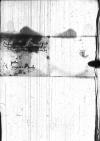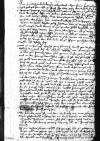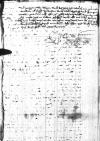E(wer) G(nade)n cf. Ioannes DANTISCUS to Ulrich EHINGER 1534-12-18, CIDTC IDL 6961, letter lost;
Ioannes DANTISCUS to Ulrich EHINGER 1535-01-04, CIDTC IDL 6962, letter lost⌊schreib(en)cf. Ioannes DANTISCUS to Ulrich EHINGER 1534-12-18, CIDTC IDL 6961, letter lost;
Ioannes DANTISCUS to Ulrich EHINGER 1535-01-04, CIDTC IDL 6962, letter lost⌋, der datt(um) XVIII Decembris und 4 Janner, sein mir vergang(enen) tag wol zu kom(m)en, daraus ich Ewer G(nade)n gesundthait und benueglich leben mit sondren fróden vernom(m)en hab. Gott der herr well Ewer G(nade)n söllchs lange zeit mit genad(en) bestett(en), amen(n). So haben factors of The FUGGERS ⌊der Fugger leutfactors of The FUGGERS ⌋ mir und Albrecht Cuon (Kohn) (†after 1559), a German merchant from Nuremberg, and the Welsers' factor in Spain (Oberdeutsche Kaufleute, p. 36, footnote 122)⌊Albrechten Cou(n)Albrecht Cuon (Kohn) (†after 1559), a German merchant from Nuremberg, and the Welsers' factor in Spain (Oberdeutsche Kaufleute, p. 36, footnote 122)⌋ die XXXVIII d(ucaten), so wir der Isabel Delgada (†after 1546-06-15), Dantiscus' paramour during his stay in Spain, mother of his two children, Juana and Juan (Juan died in childhood)⌊Isabel DelgadaIsabel Delgada (†after 1546-06-15), Dantiscus' paramour during his stay in Spain, mother of his two children, Juana and Juan (Juan died in childhood)⌋ gelich(en) hett(en), von Ewer G(nade)n weg(en) zu Gdańsk (Danzig, Dantiscum), city in northern Poland, on the Bay of Gdańsk at the mouth of the Vistula, on the Baltic, the biggest and wealthiest of the three Great Prussian Cities (Gdańsk, Thorn (Toruń), and Elbing (Elbląg)) with representation in the Council of Royal Prussia; a member of the Hanseatic League⌊Danck(e)Gdańsk (Danzig, Dantiscum), city in northern Poland, on the Bay of Gdańsk at the mouth of the Vistula, on the Baltic, the biggest and wealthiest of the three Great Prussian Cities (Gdańsk, Thorn (Toruń), and Elbing (Elbląg)) with representation in the Council of Royal Prussia; a member of the Hanseatic League⌋ wid(er) entricht / und dieweil es mit gemelter Isabel die gestallt hat, / d(a)z jecz der recht vatter herr Fabian (dem ich von E(wer) G(nade)n weg(en) alle freundtschafft erzaig) selbst hie / und sÿ / E(wer) G(nade)n erpottnen guthaith so undanckpar / ist, woll(en) wir uns ir weiter nit annem(m)en, sonder sÿ sampt dem Juana Dantisca (*1527 – †1601), daughter of Ioannes Dantiscus and Isabel Delgada; wife of Diego Gracián de Alderete (SKOLIMOWSKA 2004, p. 52; LLAMAS 1995; LLAMAS 1999; LLAMAS 2001; LLAMAS, SKOLIMOWSKA; MELGAR, 37, ...)⌊kindJuana Dantisca (*1527 – †1601), daughter of Ioannes Dantiscus and Isabel Delgada; wife of Diego Gracián de Alderete (SKOLIMOWSKA 2004, p. 52; LLAMAS 1995; LLAMAS 1999; LLAMAS 2001; LLAMAS, SKOLIMOWSKA; MELGAR, 37, ...)⌋ / laut E(wer) G(nade)n schre(iben) gemelt(en) irem recht(en) vatter also befolch(en) hab(en).
E(wer) G(nade)n newzeitung(en) sag ich gancz fruntlich(en) danckh. Gott der herr verleÿch sein gnad sich die allso all v(er)folg(en) mit d(er) warhait, dan(n) es alles gut zeitong(e) sein fur gemaine cristenhait und wiewol an der zeitong von Rhodes (Rodos), island in the Aegean Sea, 1522-12 - 1912 belonged to the Ottoman Empire⌊RodisRhodes (Rodos), island in the Aegean Sea, 1522-12 - 1912 belonged to the Ottoman Empire⌋ nischt, / so ist doch zuverhoff(en), w(er)d(en) gar pald war werd(en), dan(n) wir sonder zweÿffel acht(en), ir Charles V of Habsburg (*1500 – †1558), ruler of the Burgundian territories (1506-1555), King of Spain as Charles I (1516-1556), King of Naples and Sicily, King of the Romans (1519-1530), Holy Roman Emperor of the German Nation (elected 1519, crowned 1530, abdicated 1556); son of Philip I the Handsome and Joanna the Mad of Castile⌊m(aieste)tCharles V of Habsburg (*1500 – †1558), ruler of the Burgundian territories (1506-1555), King of Spain as Charles I (1516-1556), King of Naples and Sicily, King of the Romans (1519-1530), Holy Roman Emperor of the German Nation (elected 1519, crowned 1530, abdicated 1556); son of Philip I the Handsome and Joanna the Mad of Castile⌋ durch die genad Gotts / und mit der gewaltig(en) rustong und armade sich nit allein Rodis, / sond(er) gancz Africa, the continent⌊AffricaAfrica, the continent⌋ und Constantinople (Istanbul, Constantinopolis), city and capital of the Ottoman Empire, today in western Turkey⌊ConstantinopelConstantinople (Istanbul, Constantinopolis), city and capital of the Ottoman Empire, today in western Turkey⌋, auch Greece⌊GreciaGreece⌋ zeerobern understen wird. Denmach ware zeitong forhand(en) ist, / d(a)z der The Ottoman Turks (Turcae) ⌊TurgkThe Ottoman Turks (Turcae) ⌋ vom Tahmāsp I Safavid (Sophi) (*1514 – †1576), 1524-1576 Shah of Persia, 2nd. Shah of the Safavid dynasty, ruled 1524 - 1576. Son and successor of Ismail I Safavid ⌊SophiTahmāsp I Safavid (Sophi) (*1514 – †1576), 1524-1576 Shah of Persia, 2nd. Shah of the Safavid dynasty, ruled 1524 - 1576. Son and successor of Ismail I Safavid ⌋ gan(n)cz uberwund(en) und v(er)trib(en) ist.
Aus den America, the continent⌊IndiasAmerica, the continent⌋ kom(m)en je lenger, je grósser zeitong(en) und unnamhafte grosse reichtumb. / Sein zu Seville (Sevilla, Hispalis, Sivillia), city in southwestern Spain, Andalusia, on the Guadalquivir river⌊Sib(illa)Seville (Sevilla, Hispalis, Sivillia), city in southwestern Spain, Andalusia, on the Guadalquivir river⌋ erst vor 2 monat(en) 4 schiff ankomme(n), die ob 1500m superinscribed⌈mm superinscribed⌉ d(ucaten) in gold und silber pracht hab(en), davon Charles V of Habsburg (*1500 – †1558), ruler of the Burgundian territories (1506-1555), King of Spain as Charles I (1516-1556), King of Naples and Sicily, King of the Romans (1519-1530), Holy Roman Emperor of the German Nation (elected 1519, crowned 1530, abdicated 1556); son of Philip I the Handsome and Joanna the Mad of Castile⌊ir m(aieste)tCharles V of Habsburg (*1500 – †1558), ruler of the Burgundian territories (1506-1555), King of Spain as Charles I (1516-1556), King of Naples and Sicily, King of the Romans (1519-1530), Holy Roman Emperor of the German Nation (elected 1519, crowned 1530, abdicated 1556); son of Philip I the Handsome and Joanna the Mad of Castile⌋ hat her pring(en) lass(en), umb hier in probably Spain (Hispania)⌊Cronen(n)probably Spain (Hispania)⌋ zcumu(n)czen(n) 300m superinscribed⌈mm superinscribed⌉ d(ucaten) schwer gold und silber, welches uff XXVIII dis monats Appril uff 21 trageslen wol her kome(n) ist. So thut man(n) zu Seville (Sevilla, Hispalis, Sivillia), city in southwestern Spain, Andalusia, on the Guadalquivir river⌊SibillaSeville (Sevilla, Hispalis, Sivillia), city in southwestern Spain, Andalusia, on the Guadalquivir river⌋ auch anders nicht, dan mincze(n), von dar ir m(aieste)t thail nach Flanders (Flandria), county in the Low Countries, part of the Habsburg Netherlands from 1482, today corresponding to the Belgian provinces of Western Flanders and Eastern Flanders, the region of Zeeuws-Vlaanderen in the Netherlands and part of the Département du Nord in France⌊FlanderFlanders (Flandria), county in the Low Countries, part of the Habsburg Netherlands from 1482, today corresponding to the Belgian provinces of Western Flanders and Eastern Flanders, the region of Zeeuws-Vlaanderen in the Netherlands and part of the Département du Nord in France⌋, Germany (Germania, Niemcy)⌊TeutschlandGermany (Germania, Niemcy)⌋ und Italy (Italia)⌊IttalliaItaly (Italia)⌋ v(er)wexlet hatt, / also d(a)z sÿ an allen ort(en) zur nottorfft v(er)seh(en) / ist, / an nicht(en) kain mangel, dan allain, d(a)z u[...] paper damaged⌈[...][...] paper damaged⌉ Gott mit sein genad(en) beÿstand, so well wir, ob Gott will, allen feÿend(en) der cristenhait starkh genug sein.
Der Hernán Cortés de Monroy e Pizarro (*1485 – †1547), Spanish conquistador and Dantiscus' friend⌊Hernando CortesHernán Cortés de Monroy e Pizarro (*1485 – †1547), Spanish conquistador and Dantiscus' friend⌋ ist aus seim land auch mit ainer gut(en) armade paper damaged⌈[de]de paper damaged⌉ weiter zedestubriere(n) auszog(en) in ain land, davon er von uber aus grosser reichtumb notticia hab(en) soll. / Seÿen teglich, was er ausricht, von im zeitong gewertig, d(a)z mag E(wer) G(nade)n hernach anzaigt werd(en).
Ich pin willens sampt meinem(m) lieb(en) Ursula Meuting daugther of Lucas Meuting, member of the merchant family in Augsburg; from 1530 wife of Ulrich Ehinger (ZELINSKY HANSON, p. 123 and footnote 46; EIRICH, p. 170)⌊gemachelUrsula Meuting daugther of Lucas Meuting, member of the merchant family in Augsburg; from 1530 wife of Ulrich Ehinger (ZELINSKY HANSON, p. 123 and footnote 46; EIRICH, p. 170)⌋ Ewer G(nade)n gefattherin sampt aine(m) new geporen son, / so uns Gott in Spain (Hispania)⌊disen land(en)Spain (Hispania)⌋ geb(en) hat, / noch ain zeit in disen land(en) zu rue siczen, / pis ich sech was aus written over nd⌈ndusus written over nd⌉ disen schweren(n) und sorgklich(en) löff(en) werd(en) well und pis die seckt(en)  AAWO, AB, D. 92, f. 47v und partheÿen der religion und des glob(en) halb / durch ain gut cristeliche hidden by binding⌈[he]he hidden by binding⌉ concillium od(er) sonst in unsern land(en) wid(er) v(er)glich(en) und v(er)ainigt werden hidden by binding⌈[den]den hidden by binding⌉. Wollt Gott, wie auch E(wer) G(nade)n meld(en), d(a)z wir unser wonung mit [...] stain⌈[...][...] stain⌉ hug / nachet pey ain andren gehaben(n) und also ain a(n)nd(er) die weil v(er)treib(en) mócht(en), / weÿl es aber nit gesein mag, / well wir die sach Gotte stain⌈[te]te stain⌉ dem(m) herre(n) befelch(en) / und ain andren(n) dest óffter mit brieff(en) ersuch(en).
AAWO, AB, D. 92, f. 47v und partheÿen der religion und des glob(en) halb / durch ain gut cristeliche hidden by binding⌈[he]he hidden by binding⌉ concillium od(er) sonst in unsern land(en) wid(er) v(er)glich(en) und v(er)ainigt werden hidden by binding⌈[den]den hidden by binding⌉. Wollt Gott, wie auch E(wer) G(nade)n meld(en), d(a)z wir unser wonung mit [...] stain⌈[...][...] stain⌉ hug / nachet pey ain andren gehaben(n) und also ain a(n)nd(er) die weil v(er)treib(en) mócht(en), / weÿl es aber nit gesein mag, / well wir die sach Gotte stain⌈[te]te stain⌉ dem(m) herre(n) befelch(en) / und ain andren(n) dest óffter mit brieff(en) ersuch(en).
 AAWO, AB, D. 92, f. 47v und partheÿen der religion und des glob(en) halb / durch ain gut cristeliche hidden by binding⌈[he]he hidden by binding⌉ concillium od(er) sonst in unsern land(en) wid(er) v(er)glich(en) und v(er)ainigt werden hidden by binding⌈[den]den hidden by binding⌉. Wollt Gott, wie auch E(wer) G(nade)n meld(en), d(a)z wir unser wonung mit [...] stain⌈[...][...] stain⌉ hug / nachet pey ain andren gehaben(n) und also ain a(n)nd(er) die weil v(er)treib(en) mócht(en), / weÿl es aber nit gesein mag, / well wir die sach Gotte stain⌈[te]te stain⌉ dem(m) herre(n) befelch(en) / und ain andren(n) dest óffter mit brieff(en) ersuch(en).
AAWO, AB, D. 92, f. 47v und partheÿen der religion und des glob(en) halb / durch ain gut cristeliche hidden by binding⌈[he]he hidden by binding⌉ concillium od(er) sonst in unsern land(en) wid(er) v(er)glich(en) und v(er)ainigt werden hidden by binding⌈[den]den hidden by binding⌉. Wollt Gott, wie auch E(wer) G(nade)n meld(en), d(a)z wir unser wonung mit [...] stain⌈[...][...] stain⌉ hug / nachet pey ain andren gehaben(n) und also ain a(n)nd(er) die weil v(er)treib(en) mócht(en), / weÿl es aber nit gesein mag, / well wir die sach Gotte stain⌈[te]te stain⌉ dem(m) herre(n) befelch(en) / und ain andren(n) dest óffter mit brieff(en) ersuch(en).


